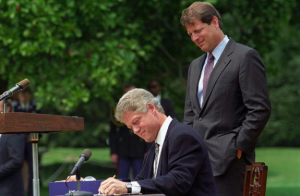Presidential Debate: Bill Clinton on the National Debt (October 15, 1992)
In this clip from the October 15, 1992 presidential debate held at the University of Richmond in Richmond, Virginia, Arkansas Governor Bill Clinton responds to a question regarding the state of the national economy. Asked how the national debt personally affected him, Governor Clinton replied with personal antidotes that lent credence to his answer, saying that when factories closed and people lost their jobs, he likely personally knew a number of the individuals. Conducted in a town hall format, the debate focused on key economic issues. Clinton cited the failures of the Bush administration, and that in order to put America back on track, the government needed to pass a balanced budget while simultaneously increasing spending and taxes. Clinton’s performance in this debate, and particularly his personal, heartfelt response to this question, won over many Americans, as he came across as very personable and not another big-whig in government. His newfound popularity catapulted him to the presidency, where he instituted new taxes and government programs that increased spending, a sharp contrast to his Republican predecessors in Presidents Reagan and Bush.
President Clinton Signs H.R. 2254 (1993)

This photo depicts President Bill Clinton signing the Omnibus Budget Reconciliation Act of 1993 on the South Lawn of the White House. The act raised taxes on the top bracket from twenty eight percent to thirty six percent and increased the corporate tax rate by two percent. This was a stark change from the previous administrations who had held a traditionally limited government mentality. Clinton strived to put government back into people’s homes and pockets, and another manner in which he did this was including a four-cent tax on gasoline in his omnibus act. However, even though he drastically raised taxes and was ultimately impeached on unrelated grounds, Clinton garnered popularity because over eighteen million jobs were created and unemployment dropped over three and a half percent during his time in office. Additionally, he managed to turn a budget deficit into a surplus. His approach to economic theory and policy starkly contrasted with that of his predecessors, but he nonetheless found and achieved success.
